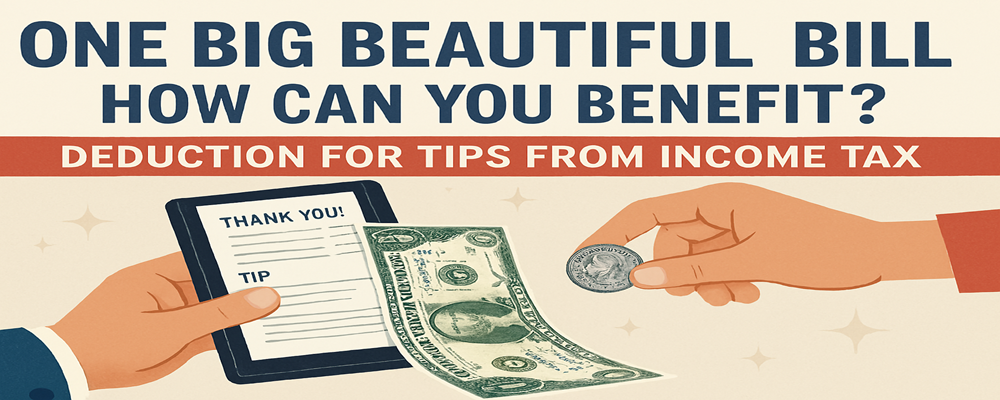One Big Beautiful Bill Tax Act – How Can You Benefit?
Focus: Deduction For Tips From Income Tax
On July 4, 2025 President Donald J. Trump signed into law H.R.1 – One Big Beautiful Bill Act (“OBBBA”). OBBBA contains hundreds of provisions including permanently extending the individual tax rates Trump signed into law in 2017, which were originally set to expire at the end of 2025.
One of the provisions of the OBBBA provides federal income tax deductions for a portion of an eligible worker’s tips. This deduction is temporary and is set to expire after the 2028 tax year.
Prior Law
All income is subject to federal income taxes except as provided otherwise under the Internal Revenue Code. There is no distinction from worker’s tips or overtime earnings. In addition, worker’s tips and overtime earnings are subject to Social Security and Medicare taxes (as well as state and local taxes).
New Law – Deduction for tips
OBBBA creates a separate deduction for tipped workers, allowing them to deduct up to $25,000 of qualified tips earned. OBBBA also creates a temporary deduction from gross income for premium pay for overtime hours worked; however, the focus of this article is on further clarification on tips. For more information on the deduction for overtime pay, click here.
But beware on the deduction for tips …
Similarly to the overtime deduction, the allowable deduction for tipped earnings is reduced by $100 for each $1,000 by which the tipped worker’s gross income exceeds $150,000 (or $300,000, in the case of a joint return). Only tips that are paid voluntarily by the customer or client, not subject to negotiation, may be deducted as qualified tips. Tips received under tip-sharing arrangements also count as qualified tips; however, earnings from mandatory service charges assessed automatically to customers are not deductible as qualified tips.
Furthermore, the deduction is available only for tips earned in “traditionally and customarily tipped industries.” This means the hospitality industry (restaurants and hotels), and other businesses where tips are common (such as nail or hair salons). The Treasury Secretary has released a list of occupations that have customarily and regularly received tips on or prior to December 31, 2024.
List of occupations that qualify for the “No tax on tips” measure:
Beverage and food service
|
Entertainment and events
|
Hospitality and guest services
|
Home services
|
Personal services
|
Personal appearance and wellness
|
Recreation and instruction
|
Transportation and delivery
|
OBBBA also includes an employer tax credit for Social Security taxes paid on all qualified tips which under prior law was applicable only to food or beverage service employees but now this credit extends to all employees that customarily receive tips in all industries such as in the industry of beauty services (i.e., hair care, nail care, and spa treatments).
This deduction also applies to individuals who are not statutory employees but who earn tips during a trade or business. The tip deduction only applies to the extent that the income from that trade or business (including tips) exceeds the full sum of allowable deductions (not counting the tip deduction) allocable to that trade or business. In another words, to the extent that the tip deduction would result in a loss in your business, you would not be able to claim the full tip deduction amount.
Impact on employers
Starting with the 2025 tax year, employers are required to separately report on Form W-2 the portion of the employee’s pay that is For qualified overtime compensation and the employee’s qualifying tip-earning compensation. non-employees, businesses must publish a statement identifying the portion of payments made to the individual that are designated as cash tips, as well as the individual’s qualifying tip-earning occupation.
There is a transition rule for the 2025 tax year that permits employers to approximate a separate accounting of amounts designated as cash tips by any reasonable method specified by the IRS. Our office will be on the lookout for the IRS’ announcement on this and we will share this information when it becomes available.
If you are an employer using a payroll service, you should check with your service provider on what information they need to accurately report on the 2025 Form W-2 each employee’s qualified overtime compensation and qualifying tip-earning compensation. Also, where the employer filed 2025 quarterly employment tax returns (Form 941) without claiming a tax credit for Social Security taxes paid qualified tips, amended employment tax returns should be prepared and filed to claim these overpaid amounts.
What Should You Do?
You know that at the Law Offices Of Jeffrey B. Kahn, P.C. we are always thinking of ways that our clients can save on taxes. If you are selected for an audit, stand up to the IRS by getting representation. Tax problems are usually a serious matter and must be handled appropriately so it’s important to that you’ve hired the best lawyer for your particular situation. It is advisable to consult with a tax professional to understand how these tips and overtime deduction changes might affect your specific tax situation, especially if your income relies on tips and/or overtime or you are an employer. The tax attorneys at the Law Offices Of Jeffrey B. Kahn, P.C. located in Orange County (Irvine), Los Angeles, San Francisco Bay Area (including San Jose and Walnut Creek) and elsewhere in California are highly skilled in handling tax matters and can effectively represent at all levels with the IRS and State Tax Agencies including criminal tax investigations and attempted prosecutions, undisclosed foreign bank accounts and other foreign assets, and unreported foreign income. Also if you are involved in cannabis, check out what a cannabis tax attorney can do for you. And if you are involved in crypto currency, check out what a bitcoin tax attorney can do for you.


 Follow
Follow Follow
Follow
